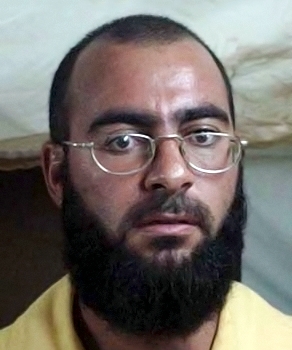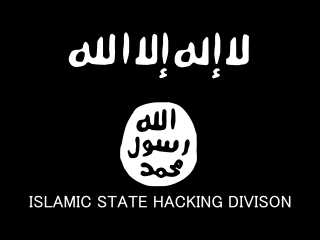Related Research Articles

Internet activism, hacktivism, or hactivism, is the use of computer-based techniques such as hacking as a form of civil disobedience to promote a political agenda or social change. With roots in hacker culture and hacker ethics, its ends are often related to free speech, human rights, or freedom of information movements.

The Islamic State (IS), also known as the Islamic State of Iraq and the Levant (ISIL), the Islamic State of Iraq and Syria (ISIS) and by its Arabic acronym Daesh, is a transnational Salafi jihadist group and a former unrecognised quasi-state. Its origins were in the Jai'sh al-Taifa al-Mansurah organization founded by Abu Omar al-Baghdadi in 2004, which fought alongside al-Qaeda during the Iraqi insurgency. The group gained global prominence in 2014, when its militants successfully captured large territories in northwestern Iraq and eastern Syria, taking advantage of the ongoing Syrian civil war. By the end of 2015, it ruled an area with an estimated population of twelve million people, where it enforced its extremist interpretation of Islamic law, managed an annual budget exceeding US$1 billion, and commanded more than 30,000 fighters.

Anonymous is a decentralized international activist and hacktivist collective and movement primarily known for its various cyberattacks against several governments, government institutions and government agencies, corporations and the Church of Scientology.
Turks in Jordan, also known as Turkish Jordanians or Jordanian Turks and Jordanian Turkmen, are people of Turkish ancestry living in Jordan. These people have had a thriving presence in Jordan since the rule of the Ottoman Empire. Today, there is a minority of about 60,000 people in the country who are the descendants of the Ottoman-Turkish immigrants. In addition to this, there are also 8,262 Turkish citizens who are recent migrants to Jordan.

Ibrahim Awad Ibrahim Ali al-Badri, commonly known by his nom de guerreAbu Bakr al-Baghdadi, was an Iraqi militant who was the first caliph of the Islamic State (IS) from 2014 until his death.
Anonymous is a decentralized virtual community. They are commonly referred to as an internet-based collective of hacktivists whose goals, like its organization, are decentralized. Anonymous seeks mass awareness and revolution against what the organization perceives as corrupt entities, while attempting to maintain anonymity. Anonymous has had a hacktivist impact. This is a timeline of activities reported to be carried out by the group.

Many states began to intervene against the Islamic State, in both the Syrian Civil War and the War in Iraq (2013–2017), in response to its rapid territorial gains from its 2014 Northern Iraq offensives, universally condemned executions, human rights abuses and the fear of further spillovers of the Syrian Civil War. These efforts are called the war against the Islamic State, or the war against ISIS. In later years, there were also minor interventions by some states against IS-affiliated groups in Nigeria and Libya. All these efforts significantly degraded the Islamic State's capabilities by around 2019–2020. While moderate fighting continues in Syria, as of 2024, ISIS has been contained to a manageably small area and force capability.

Mohammed Emwazi was a British militant of Kuwaiti origin seen in several videos produced by the Islamist extremist group Islamic State (IS) showing the beheadings of a number of captives in 2014 and 2015. A group of his hostages nicknamed him "John" since he was part of a four-person terrorist cell with English accents whom they called 'The Beatles'; the press later began calling him "Jihadi John".

The Military of the Islamic State is the fighting force of the Islamic State (IS). The total force size at its peak was estimated from tens of thousands to over two hundred thousand. IS's armed forces grew quickly during its territorial expansion in 2014. The IS military, including groups incorporated into it in 2014, openly operates and controls territory in multiple cities in Libya and Nigeria. In October 2016, it conquered the city of Qandala in Puntland, Somalia. It conquered much of eastern Syria and western Iraq in 2014, territory it lost finally only in 2019. It also has had border clashes with and made incursions into Lebanon, Iran, and Jordan. IS-linked groups operate in Algeria, Pakistan, the Philippines, and in West Africa. In January 2015, IS was also confirmed to have a military presence in Afghanistan and in Yemen.
Raqqa Is Being Slaughtered Silently is a citizen journalist group reporting Syrian war news and human rights abuses by Islamic State of Iraq and the Levant (ISIL) and other forces occupying the northern Syrian city of Raqqa which ISIL used as its de facto capital. RBSS works to counter the suggestion that citizens of Raqqa welcomed the presence of ISIL. Some sources described the group as one of the few reliable sources of information from the city. It was founded by Abu Ibrahim a-Raqqawi. RBSS has described itself as an "nonpartisan and independent" news page.

Kayla Jean Mueller was an American human rights activist and humanitarian aid worker from Prescott, Arizona, United States. She was taken captive in August 2013 in Aleppo, Syria, after leaving a Doctors Without Borders hospital. Media had long reported that a 26-year-old American aid worker was being held by ISIS without naming her, at her family's request. In 2015, she was killed in uncertain circumstances. The operation that killed ISIS leader Abu Bakr al-Baghdadi was named Operation Kayla Mueller, in her honor.
Junaid Hussain was a British black hat hacker and propagandist under the nom de guerre of Abu Hussain al-Britani who supported the Islamic State of Iraq and the Levant (ISIL). Hussain, who was raised in Birmingham in a family originally from Pakistan, was jailed in 2012 for hacking Tony Blair's accounts and posting his personal information online. Hussain left the UK around 2013 for Syria.

The Hacker Wars is a 2014 documentary film about hacktivism in the United States, directed by Vivien Lesnik Weisman. It was released on October 17, 2014 in the US.
Ghost Security, also known as GhostSec, is a self-described "vigilante" group that was formed to attack ISIS websites that promote Islamic extremism. It is considered an offshoot of the Anonymous hacking collective. According to experts of online jihad activism, the group gained momentum after the Charlie Hebdo shooting in Paris in January 2015. The group claims to have taken down hundreds of ISIS-affiliated websites or social media accounts and thwarted potential terrorist attacks by cooperating with law enforcement and intelligence agencies. The group uses social media hashtags like #GhostSec - #GhostSecurity or #OpISIS to promote its activities.

The Islamic State Hacking Division (ISHD) or The United Cyber Caliphate(UCC) is a merger of several hacker groups self-identifying as the digital army for the Islamic State of Iraq and Levant (ISIS/ISIL). The unified organization comprises at least four distinct groups, including the Ghost Caliphate Section, Sons Caliphate Army (SCA), Caliphate Cyber Army (CCA), and the Kalashnikov E-Security Team. Other groups potentially involved with the United Cyber Caliphate are the Pro-ISIS Media group Rabitat Al-Ansar (League of Supporters) and the Islamic Cyber Army (ICA). Evidence does not support the direct involvement of the Islamic State leadership. It suggests external and independent coordination of Pro-ISIS cyber campaigns under the United Cyber Caliphate(UCC) name. Investigations also display alleged links to Russian Intelligence group, APT28, using the name as a guise to wage war against western nations.
This article contains a timeline of events from January 2015 to December 2015 related to the Islamic State of Iraq and the Levant (ISIL/ISIS). This article contains information about events committed by or on behalf of the Islamic State, as well as events performed by groups who oppose them.

Defeating ISIS: Who They Are, How They Fight, What They Believe is a non-fiction book about counterterrorism against ISIS. It was written by Malcolm Nance, a former cryptology analyst, with a foreword by Richard Engel. Its thesis is that ISIS is not part of Islam, instead, it functions as a separate destructive extremist group. He emphasizes the fact that the majority of those who have been harmed by ISIS are themselves Muslim. The book traces the history of the movement back to the history of Al-Qaeda in Iraq, and it also discusses ISIS's combat style and recruiting tactics. Nance offers a four-point plan to defeat ISIS, including airpower and special forces, Internet tactics, strengthening the Syrian military, and engaging Arab world states.
The Islamic State is a militant group and a former unrecognised proto-state. The group sophisticatedly utilizes social media as a tool for spreading its message and for international recruitment. The Islamic State is widely known for its posting of disturbing content, such as beheading videos, on the internet. This propaganda is disseminated through websites and many social media platforms such as Twitter, Facebook, Telegram, and YouTube. By utilizing social media, the organization has garnered a strong following and successfully recruited tens of thousands of followers from around the world. In response to its successful use of social media, many websites and social media platforms have banned accounts and removed content promoting the Islamic State from their platforms.
Ghost Squad Hackers ("GSH") is a hacktivist group responsible for several cyber attacks. Former targets of the group include central banks, Fox News, CNN, the United States Armed Forces and the government of Israel. The group is led by a de facto leader known as s1ege, and selects targets primarily for political reasons. The group forms a part of the hacktivist group Anonymous.
The Katiba des Narvalos is a non-partisan collective constituted from citizens from all venues of life, dedicated to fighting jihadism on social networks and more generally on the Internet. Their tactics comprise parody, as to discredit jihadist propaganda; surveying and reporting offending accounts; and infiltrating cyber-jihadist networks as to prevent terrorist attacks.
References
- ↑ "Meet the former beauty queen taking on ISIS". NewsComAu. 2015-07-14. Retrieved 2019-11-21.
"33-year-old former pageant-goer" [in 2015]
- 1 2 3 Tarabay, Jamie; Tzach, Liran; Cuen, Leigh (July 10, 2015). "Beauty Queen Hacktivist Fighting ISIS: "We Won't Stop"". Vocativ. Retrieved 2019-11-21.
- 1 2 3 White, Mark (2015-11-11). "Digital vigilantes: the online fight against Islamic State". The Sydney Morning Herald. Retrieved 2019-11-21.
- 1 2 al-Shibeeb, Dina (July 15, 2015). "Beauty queen hacktivist fighting ISIS: 'We won't stop'". english.alarabiya.net. Retrieved 2019-11-21.
- 1 2 Heigl, Alex (July 23, 2015). "Former Miss Jordan Joins Hacktivist Group to Fight ISIS". PEOPLE.com. Retrieved 2019-11-21.
- 1 2 3 4 5 6 7 8 Noman, Natasha (July 22, 2015). "This Jordanian Left Her Life as a Beauty Queen to Be an Islamic State-Fighting Hacktivist". Mic. Retrieved 2019-11-21.
- ↑ Smith IV, Jack (December 4, 2015). "Anonymous Divided: Inside the Two Warring Hacktivist Cells Fighting ISIS Online". Mic. Retrieved 2019-11-21.
- ↑ "Hunting ISIS On The Darknet: The FBI's De facto Collaboration With Anonymous | The Black Sphere with Kevin Jackson | TheBlackSphere.net". The Black Sphere. 2015-07-13. Retrieved 2019-11-21.
- ↑ Luck, Taylor (2015-08-25). "Have US laws created an online haven for Islamic State propaganda?". Christian Science Monitor. ISSN 0882-7729 . Retrieved 2019-11-21.
- ↑ Singer, Peter Warren; Brooking, Emerson T. (2018). Likewar: The Weaponization of Social Media. Houghton Mifflin Harcourt. p. 213. ISBN 978-1-328-69574-1.